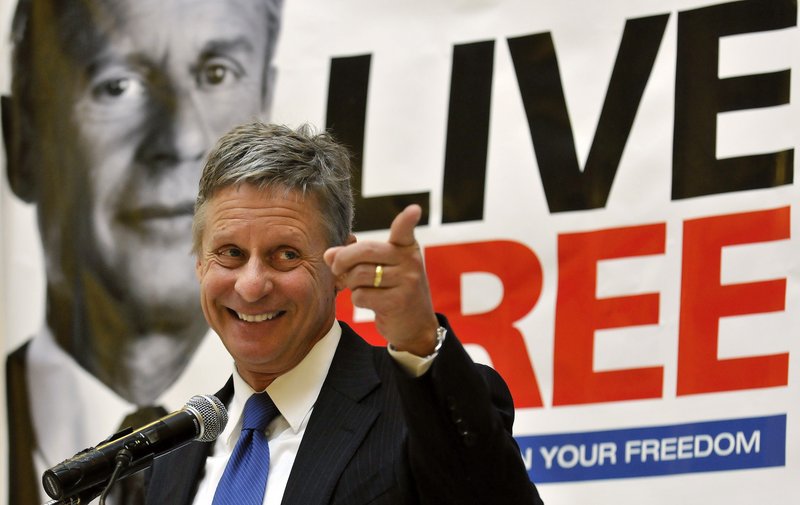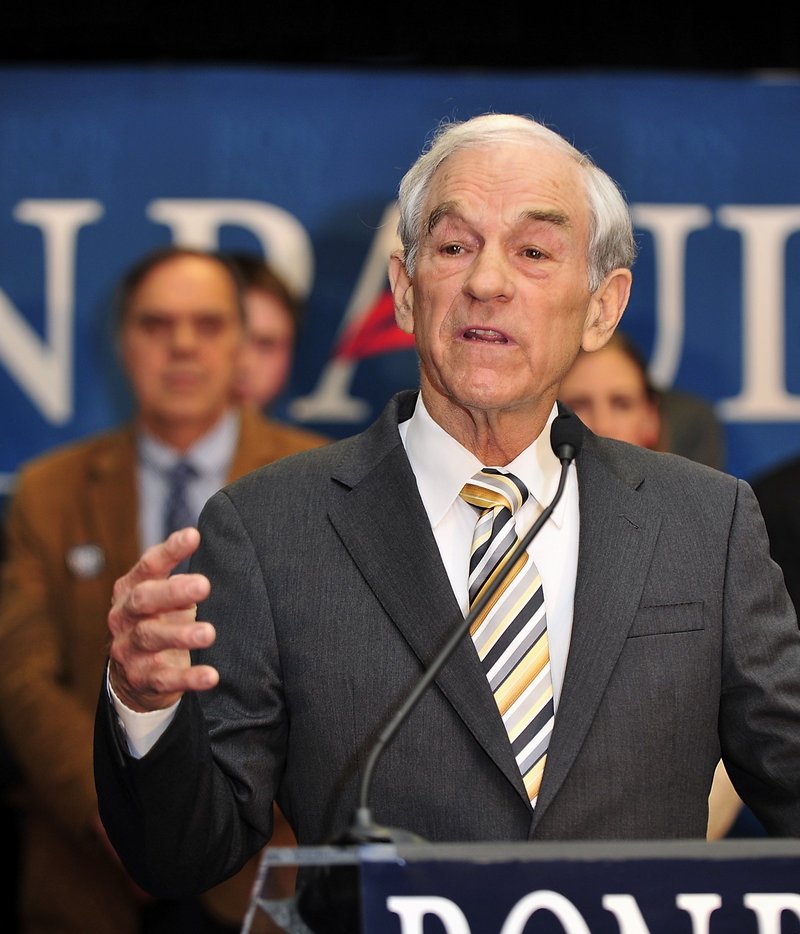Gary Johnson isn’t a household name in Maine or most other places. Yet the Libertarian presidential candidate could become an attractive option at the ballot box for some of the same voters who helped sweep Republicans into power here just two years ago.
The former governor of New Mexico will be on the Nov. 6 ballot in 34 states, including Maine. National pundits say Johnson has no chance of winning the presidency, but some believe he could be a spoiler candidate in several swing states, such as Nevada, Virginia, Florida, North Carolina and Colorado. Although Maine isn’t among those states, Johnson’s level of appeal may signal the future of the Maine Republican Party.
The reason isn’t just Johnson’s platform of limited government and fiscal conservatism, key tenets of the tea party and the current energy core of the Republican Party.
It’s also because an increasingly bitter standoff between establishment Republicans and the so-called liberty movement could spur some tea party voters to abandon the presumptive Republican nominee, Mitt Romney.
Johnson backers certainly hope so.
Jorge Maderal, chairman of the Maine Libertarian Party, said he and other Johnson supporters were talking with “disgruntled” tea party voters and backers of Ron Paul, a Republican congressman from Texas, whose bid for a speaking role at the Republican National Convention has thus far been blocked by Romney.
“It’s Ron Paul’s group. It’s the tea party group. It’s the sovereignty food group, desperate groups,” Maderal said. “They’re separated and isolated politically. Now with Gary Johnson in the race, you’re going to see a lot of people jumping ship.”
Carla Howell, executive director of the national Libertarian Party in Washington, D.C., agreed. Howell noted that Johnson will be a keynote speaker Aug. 24 at the Paul Festival in Tampa, Fla.
She said many Paul supporters will gravitate to Johnson, who developed a reputation as a staunch fiscal conservative while governor of New Mexico from 1995 to 2003. According to his campaign bio, he vetoed 750 bills while governor, earning the moniker “Governor Veto.” He cut taxes 14 times.
“Having met lots of Ron Paul supporters, especially young groups tea party groups, there’s a lot of receptiveness to Gary Johnson,” Howell said. “They don’t like Mitt Romney — they don’t want that choice. They don’t want to just drop out and be inactive. They see Gary Johnson as offering a lot of the same things as Ron Paul.”
Larry Sabato, director of the University of Virginia Center for Politics, believes some defection from the Republican Party to Johnson is likely, but difficult to quantify.
“Gary Johnson is not going to get more than a percent, probably less than a percent, nationally,” Sabato said. “Mainers have a stronger tendency to support third party candidates, so it’s always possible that Johnson’s percentage will be higher in Maine than it is elsewhere. But, you know, look, what chance does Romney really have to carry Maine anyway? Not great.”
An exodus in November, if it happens, may have less to do with electoral politics than the future of the Republican Party.
The highly mobilized tea party faction was key to 2010 Republican victories in Congress and Maine state government.
However, here and elsewhere, the movement is increasingly at odds with the so-called party establishment — and, in particular, Romney.
In Maine and six other states, the intra-party squabble surfaced publicly in a battle over delegates elected during the state convention. Establishment Republicans are challenging 20 Maine delegates who support Paul. Romney supporters fear that the delegates will disrupt the National Republican Convention, from Aug. 27 to Aug. 30 in Tampa, Fla., an event that’s designed to unify support for the nominee.
Privately, some Republicans fully expect some Paul supporters to jump ship, and in some cases it appears the establishment has calculated that the party can withstand the defection.
The reason may be simple math: While Paul and tea party supporters are energized, their numbers are relatively small.
Sabato noted that Paul, who ran as the Libertarian presidential candidate in 1998, received less than half a percent of the vote.
“I think people assume that it’s a larger vote than it actually is,” Sabato said.
The stalemate with the party poses a difficult choice for Paul supporters and the tea party. Both had hoped to advance their causes through the Republican Party infrastructure rather than build a third party.
In Maine, as in other states, the movement has had some success working within the GOP, inserting a tea party platform in 2010 and this year.
The movement has also taken some power positions within the Republican State Committee.
It may be difficult to abandon those efforts to support a little-known governor from New Mexico.
“I’m really focused on the Republican Party, and I’m a member of the Republican State Committee and going to the convention as a national delegate,” said Eric Brakey, a New Gloucester resident and Ron Paul supporter who was among the 20 delegates elected at the state convention.
“Right now my intention is to support the Republican Party. I’m not sure that going outside the party is going to be (a solution). We’ll see how things play out in Tampa. I think any kind of third party option is premature at this time,” Brakey said.
In addition, it’s not clear that the party is ready to split with the movement that played a prominent role in securing electoral victories in 2010, as evidenced by Romney’s decision to pick Wisconsin congressman Paul Ryan as his running mate.
Johnson’s supporters seemed to sense that Ryan, whose austere budget plan calls for substantial cuts to Medicare and Medicaid, may be a threat. Last Monday, Howell authored a blog post that blasted the Ryan pick.
“If Mitt Romney had chosen Ron Paul to be his VP running mate, he may well have guaranteed himself the presidency this November,” the post read. “But Mitt Romney is running his presidential campaign by special interest pandering — not by serving the needs of everyday voters, taxpayers and private sector workers. Big Government Republican Mitt Romney chose the perfect Big Government complement to his presidential campaign in his choice of Paul Ryan.”
Nonetheless, it’s not clear if such rhetoric will persuade tea party activists like Brakey.
“My game plan is to work within the Republican Party and to strengthen the liberty movement within that party,” he said. “At this point and time, I think going outside the party for other options is potentially counterproductive for what we’re trying to achieve.”
Staff Writer Steve Mistler can be contacted at 791-6345 or at:
smistler@mainetoday.com
twitter/stevemistler
This story was corrected to show Eric Brakey’s current residence.
Send questions/comments to the editors.




Comments are no longer available on this story